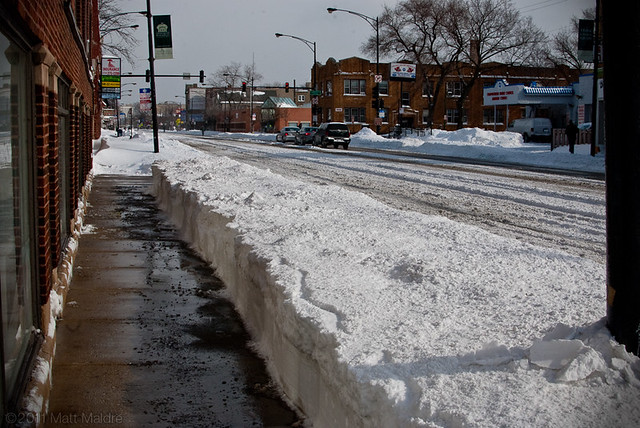
It’s puzzling why the city of Chicago hasn’t done more in the past to ensure that business and property owners promptly clear their sidewalks after snowstorms. Snowy and icy sidewalks are a major barrier for people with disabilities, seniors, and families with small children, and they’re a big annoyance for everyone else.
Tickets for failure to clear snow are easily avoidable if people do the right thing by shoveling or plowing. If they don’t, the fines are a well-deserved penalty, and a good source of revenue for our cash-strapped city. However, the Chicago Department of Transportation only issued only 226 such tickets last winter, with 90 percent of the fines going to merchants and owners of apartment and condo buildings, according to CDOT.
But the city is moving in the right direction with a proposed ordinance that would raise the fines for failure to shovel from the current $25 to $100 range to $50 to 500. The new legislation goes before City Council on Wednesday as part of the vote on Mayor Rahm Emanuel’s overall budget plan.
While a CDOT summary of the new ordinance states “There are no current plans to increase enforcement,” the higher potential fines would provide the city with a bigger stick to deter violations and punish the worst offenders. “By raising the fines, the city is better equipping CDOT personnel to issue meaningful penalties for building owners who do not shovel their sidewalks,” said CDOT spokesman Pete Scales. “The city is establishing a fine range that can be adjusted based on the scale of the violation.”
There are a bunch of other positive aspects of the new ordinance. It clarifies that business owners, as well as residential property owners, must clear a five-foot-wide path, as well as adjacent wheelchair ramps. It specifies the mandatory timeframe for shoveling:
Snow which falls or accumulates between the hours of seven a.m. and seven p.m. shall be removed as soon as practicable, but no later than ten p.m. of the same day. Snow which falls or accumulates overnight between the hours of seven p.m. and seven a.m. shall be removed as soon as practicable, but no later than ten a.m. of the same day.
Another nice addition is the stipulation that snow can’t be shoveled or blown into the street, including bike lanes. The new ordinance also states the shoveled snow may not block train stations, bus stops, building entrances bike racks, or bike-share stations. As a bonus, the legislation clarifies that newpaper boxes may not be placed within five feet of a bike rack or Divvy station.
Of course, higher penalties for merchants and private property owners won’t address the significant issue of uncleared sidewalks that aren’t located by buildings. That’s a major problem on local bridges. Meanwhile, the Department of Streets and Sanitation does an excellent job of plowing streets for drivers.
And it really would be great to see the city take the bull by the horns when it comes to increasing enforcement. Sure, there would be some political pushback if large amounts of tickets are issued, but the move would also be applauded by citizens who would appreciate not having to deal with snowy, slushy, or icy walking conditions. That would be one less winter aggravation.
Chicago really should follow the lead of Evanston, which first issues warnings to shoveling scofflaws, then tickets them, and finally hires contractors to clear the sidewalks, billing the property owners an average of $190 for the service. An approach like that would not only deter lawbreaking and fill the city of Chicago’s coffers, it would also create jobs.



